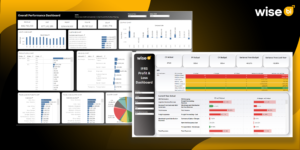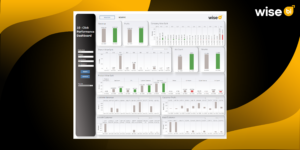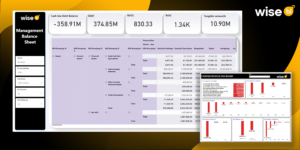At present businesses are constantly seeking the best methods to make timely data-driven decisions. Business intelligence plays a significant role in optimizing logistics operations and leads the way in this ever-growing field. The top tool that can be used to attain the objectives of logistics is Business Intelligence.
BI consists of getting, examining, and comprehending data to give background information to decision-makers and to run strategic initiatives. In this regard, BI will be useful in providing the necessary information for the operation of main areas such as inventory management, transport optimization as well as efficiency of the supply chain.
Now let`s explore the techniques and elements of BI applied to logistics and how businesses can effectively implement BI to navigate the complexities of logistics.
The Importance of BI in Logistics
BI is the backbone of the logistics industry by offering valuable information about the operations in many aspects. It allows businesses to gather and analyse data from many different sources such as transportation and warehouse management systems, IoT devices, or customer databases. This data provides organizations with an insightful overview of their supply chain operations, which enables them to identify ineffective processes and to plan for challenges in time to improve their overall performance by using data.
BI promulgates straightforward planning by furnishing decision-makers with real-time and historical data analysis. Logistics businesses can improve delivery service by using insights on stock levels, transport costs, and delivery times to route truck movements, plan efficiently, and react swiftly to changing market conditions, respectively. Furthermore, It helps organizations uncover hidden trends and patterns in their data, which in turn enables them to make data-driven decisions that will lead to operational excellence and improved customer satisfaction.
What are the Benefits of BI in Logistics?
Improved Security and Compliance:
BI tools allow the logistics business to track and isolate security threats, compliance risks, and regulatory duties more easily. The analysis of data from multiple sources enables companies to recognize any possible security and compliance problems in advance, thus allowing them to use preventive measures in risk containment. This stops the company from the hefty penalties and damage to the reputation that comes with non-compliance.
Smarter Decision-Making:
BI gives power to the decision-makers so that they can take the right actions based on the analysis done by the data. The application of the latest data analysis techniques and predictive modeling empowers businesses to forecast market tendencies, demand changes, and supply chain failures. That is what allows them to make the right decisions fast and in a very efficient manner giving them an opportunity for an edge over their competitors.
Cost Reduction:
BI uses transport-related data to identify potential areas for reducing costs by studying routes, optimizing them, and allocating resources with care. By optimizing processes and eliminating difficulties, logistic firms can reduce operational costs and improve profitability.
Better Support for Customers:
BI gives companies the ability to select, process, and analyse their client data and trends, in this way, the organizations in BI can anticipate and meet their customer’s needs. By knowing customer preferences and behaviour, logistic businesses can increase customer satisfaction to influence their loyalty, which in turn will improve business growth.
Increased Visibility and Accuracy:
Real-time visibility is monitored in every stage of the logistics process with BI tools which helps businesses to track shipments, monitor inventory levels, and accurately analyze the performance metrics. This increased visibility provides logistics firms with the ability to identify inefficiencies, find optimal routes, and maximize all operational efficiency.
Know First What You Need to Do Before Implementing BI in Logistics
- Data Quality and Integration: Data Quality and Integration work is the key to addressing the success of any BI initiative. Businesses must be ready to provide accurate and current data that they have derived from all the sources applicable. Also, data integration should be your key feature to support data flow from different systems and sources in a standard manner.
- Stakeholder Buy-In: The execution of BI requires support from all the key factors across the organization. Everyone who wishes to understand what exactly BI is and its worth, needs to embrace it as part of their day-to-day operations whether they are senior or junior. Communication should be an integral part of every organization which is aimed at gaining external support and ensuring success.
- Infrastructure and Resources: For BI to work, there should be sufficient infrastructure in place and it should include hardware, software, and experienced personnel. Businesses should review their current physical infrastructure and possibly invest in upgrades to support BI implementation. Moreover, the adequate budget for the training and the sustainability of the BI systems must be considered.
The implementation of BI in Logistics
- Define Objectives and KPIs: The first step to implementing BI in logistics is to define measurable and realistic missions, goals, or other measurable results called KPIs for the BI initiative. This guarantees that the project is kept on the right track and synchronizes with the organization’s strategic objectives.
- Assess Data Sources: Companies must evaluate their data sources and understand which ones are leading in their BI needs. The data can be from the sources of transportation management systems, warehouse management systems, and others as well. Data cleansing and preprocessing should also be added so that data are accurate and reliable.
- Choose the Right BI Tools: After the sources of data have been established, businesses then need to select the appropriate BI tools to match their needs. Such platforms are a combination of various software platforms that allow features like data visualization, predictive analytics, and real-time reporting.
- Train Users: Then, organizations should instruct the users on how to operate the BI tools. This could be done by means of carrying out training sessions, workshops, or online teaching to make sure that the employees are familiar with the technology. The success of the training effort is of paramount importance to get the best outcome of the BI implementation.
Conclusion
The organizations targeting to optimize logistics operations along with maintaining relevance in the market have to adopt business intelligence. The benefits of BI could be seen on the business side because they could make efficient decisions, high customer satisfaction, and also on operational efficiency by providing valuable information on their supply chain activities. Logistics businesses can benefit from getting higher visibility, increasing the precision of decisions, lowering costs, delivering improved customer service, and increasing operational accuracy through BI.
Before implementing BI, companies must ensure integration and quality of data, secure the backing of the stakeholders, and also set sufficient infrastructures and budgets for training. Using BI in logistics may be beneficial if organizations set clear objectives and KPIs, examine the data sources, and ensure the users get enough training.
If you’re passionate about taking your business to the next level, ensure your data is converted into a dashboard for better decision-making. Follow the blog page for all the latest insights and analysis from the world of data.




